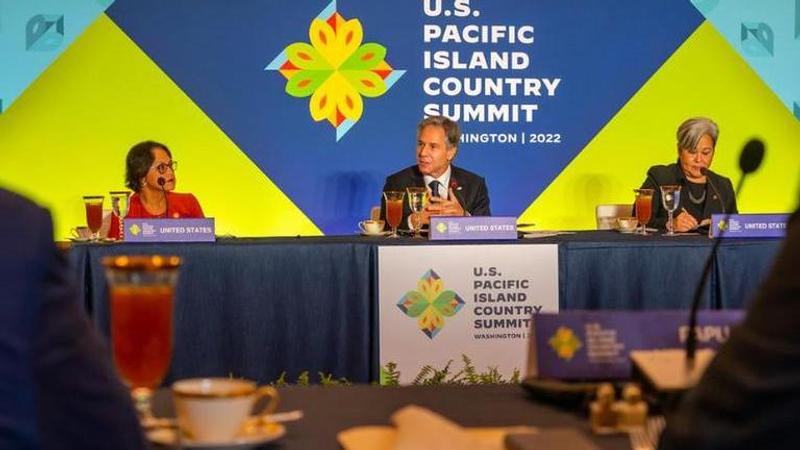Published 07:15 IST, September 30th 2022
US announces $810mn in funding for Pacific Islands to snub China's overreach
US Pacific Island strategy "is addendum to Indo-Pacific Strategy and will align with Pacific Islands Forum’s 2050 Strategy for Blue Pacific Continent," said WH.

In an effort to counter its rival China's growing regional influence and military might, the United States on Thursday formally committed to implementing the Declaration on US-Pacific Partnership, a forward-looking vision statement that reflected the two sides' shared interest to expand and deepen regional cooperation.
Biden administration launched a new diplomatic initiative — the Pacific Partnership Strategy—pledging an estimated $810 million in new funding for Pacific Island countries to tackle various issues including climate change, defence, maritime security, and economic development in an attempt to snub Beijing's overreach.
Washington, earlier this year, had formally declared at least seven commitments to Pacific Islands Forum leaders— four of the initiatives were fundamentally aid programs, and the two were aimed at expanding United States' diplomatic presence in the region. One of the commitments involves including the Pacific Islands in the Indo-Pacific strategy of the United States.
The vulnerable Pacific Island nations have been offered significant trade and investment deals by the United States' longtime adversary China, and the Biden administration has rejuvenated its geopolitical interests in the region to stricture its rival's expansionist agendas.
US to declare Pacific islands of Cook and Niue as 'sovereign states'
At the first-ever United States-Pacific Island Country Summit hosted Sep 29, Biden-Harris Administration announced scores of initiatives, including added funding under $1.5 billion to support the Pacific Islands countries and over $810 million in additional expanded programs. It also declared that the US will recognize the New Zealand realm Cook Islands and Niue as “sovereign states” in a historic move “following appropriate consultations”.
It is to be noted that the two self-governing Pacific Islands, over the last several years, have established strong independent diplomatic relations with China. While geopolitical experts called the announcement a “surprising element” of the US Pacific roadmap, one cannot overlook the fact that official recognition of the two islands will open them to US funding and initiatives, and therefore, will subsequently give the Biden administration access into those territories' affairs. The US touted the new commitments for the Pacific as a “milestone” in a region that it had long-neglected before China entered as a key player with its rebuilding efforts.
Economic Assistance Agreement associated with South Pacific Tuna Treaty
Washington also pledged to combat the climate crisis in the Pacific Island, launching a new Trade and Investment Dialogue; providing development assistance; enhancing maritime security; expanding educational opportunities; enhancing security, health, and digital capacity; and addressing painful legacies of war. The initiatives also include a 10-year $600 million Economic Assistance Agreement which was associated with the South Pacific Tuna Treaty.
The Multilateral Fisheries Treaty was signed between the United States and 16 Pacific Island countries in 1987 for up to an initial period of 5 years. It was then extended twice; most recently in 2003 through 2013. It is to be noted that the treaty lays the operational terms and conditions for the US tuna purse seine fleet to fish in the vast area of the Central and Western Pacific Ocean which also includes the waters that fall under the jurisdiction of the Pacific Island countries.
"This assistance will support fisheries economic development, collaboration on climate resilience, blue economy and maritime security," said the Biden administration, adding that it has already committed $10 million to support broader cooperation under the treaty.
The US also launched the Partnership for Global Infrastructure and Investment in the Pacific Island region, as well as committed $5 million in funding to establish a fellowship program in partnership with the University of the South Pacific and premier Pacific universities in the United States.
Biden administration also announced that it will conclude negotiations on the Compact of Free Association (COFA) with the Federated States of Micronesia, the Republic of the Marshall Islands, and the Republic of Palau by end of 2022. The three pacific Island nations are collectively known as the Freely Associated States (FAS). US President Joe Biden had appointed Ambassador Joseph Yun as Special Presidential Envoy for Compact Negotiations in March. "Through these negotiations, we will strengthen our enduring partnerships with our close Pacific Island partners and ensure a free and open and prosperous Indo-Pacific region," the US State Department had clarified then, without divulging critical details.
US plans to add India, Germany & others to Partners in the Blue Pacific (PBP) initiative
US' Pacific Island strategy "is an addendum to the Indo-Pacific Strategy of the United States and will align with the Pacific Islands Forum’s 2050 Strategy for the Blue Pacific Continent," the White House declared.
At the 51st Pacific Islands Forum Meeting in Fiji held in July 2022, the leaders welcomed and endorsed the 2050 Strategy for the Blue Pacific Continent, as the overarching blueprint to advance Pacific regionalism for the next three decades, articulating the region’s long-term vision, values, and key thematic areas and strategic pathways and ways to cooperate to achieve those visions.
United States Agency for International Development (USAID) will also open a Pacific regional mission in Suva, Fiji by September 2023, and elevate its presence in Papua New Guinea through a country representative office. US plans to add Canada, Germany, France, the European Union, the Republic of Korea, and India to the Partners in the Blue Pacific (PBP) initiative launched this year. Currently, the members are the United States, Australia, Japan, New Zealand, and the United Kingdom (UK).
Updated 07:15 IST, September 30th 2022




